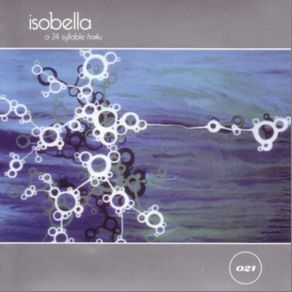A 24 Syllable Haiku
Download links and information about A 24 Syllable Haiku by Isobella. This album was released in 2001 and it belongs to Rock, Alternative genres. It contains 10 tracks with total duration of 52:16 minutes.

|
|
|---|---|
| Artist: | Isobella |
| Release date: | 2001 |
| Genre: | Rock, Alternative |
| Tracks: | 10 |
| Duration: | 52:16 |
| Buy it NOW at: | |
| Buy on iTunes $9.90 | |
Tracks
[Edit]| No. | Title | Length |
|---|---|---|
| 1. | Olive | 5:14 |
| 2. | Kidnap Someone and Make Them Happy | 5:05 |
| 3. | Diana's Secret Star | 4:13 |
| 4. | Illuminous Insect | 4:21 |
| 5. | Half Man, Half Circle | 4:33 |
| 6. | Autopilot | 5:57 |
| 7. | Reflections | 5:40 |
| 8. | Beneath the Flood | 5:00 |
| 9. | Broken Verbs | 7:20 |
| 10. | Traces | 4:53 |
Details
[Edit]Isobella's second album lives up to the promise of the first and betters it, thanks to a series of excellent songs and involved, passionate performances that result in an experience that combines the best of several styles without specifically aping any. Laura Poinsette's singing is the killer point of the band here, rich and strong in a way that suggests goth but without the ham dramatics — more a sense of strong projection along the same lines as Faith & Disease's Dara Rosenwasser, but with a lower register. It's captivating and just right for the music, which draws on obvious shoegaze roots but finds its own lively and lovely spin, again suggesting a bit of goth elegance and moodiness at many points. "Kidnap Someone and Make Them Happy" works well thanks to Poinsette's prominent keyboards and the blend of guitars. If any one band is a logical starting point to draw on what Isobella is doing here, it would be late-'80s Cure, but the combination of Poinsette's singing and the mix of guitar styles on the part of Shane Mclaughlin and Brad Richardson defies an easy one-two connection. Other influences suggest themselves throughout, notably the Cocteau Twins on "Diana's Secret Star," specifically the lead guitar melody and drum machine interplay, and the almost watery reverb on "Broken Verbs." Further album highlights: "Autopilot," with a particularly attractive guitar part and softly rising keyboards providing the main flow of the song; the miniature epic "Beneath the Flood," moving from peak to peak just so as the song progresses; and the droning, politely psyched-out conclusion "Traces," which lives up to its name just so thanks to the backwards guitar parts.